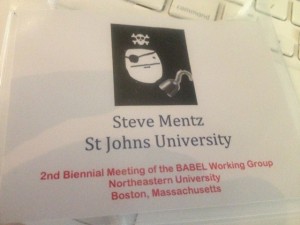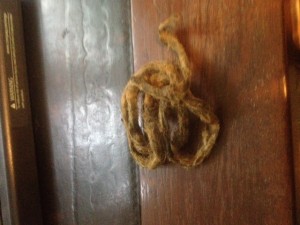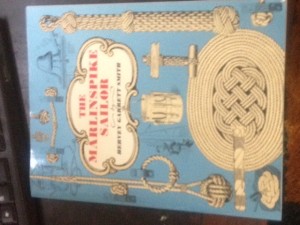What happens when you rip open a supposedly “open system”? That’s the question I find myself asking in the aftermath of BABEL, my head spinning & imagination charged. Hard to think of an academic event that contains and produces so much joy (pun intended). I’m more and more interested in performance and pleasure as essential academic virtues, which means that clearly I was in the right place.
I arrived mid-day Thursday & caught the first set of panels before that night’s plenary and reception. Started off with “Getting Medieval,” a round-table that featured the journalist and role-playing fantasy game participant Ethan Gilsdorf, author of Fantasy Freaks and Gaming Geeks, who wanted to know if we’d see the Hobbit trailor. Not yet — it only came out the day before. His insider enthusiasm was an odd fit among the professors, since his love and commitment overshadowed the fairly thin critique of industry or modernity he finds in the worlds Tolkien wrought. Thinking back on that first panel, Gilsdorf, with his almost-wizardly name, might unfairly be cast as an Uninterpretive Dragon at the gates of an imagined caricature anti-BABEL, a monster of sloppy affection and enthusiasm unattached to academic habits of analysis, pressure, or rhetorical gloss. The point, as I understand it, is to let ourselves play inside and across our academic fields and enjoy that playing — but also to find or create meanings in play itself.
But it’s not fair to pick on non-academics for not playing like academics, all the more so since the breadth of participants is one of BABEL’s real strengths. Gilsdorf also showed an interesting slide of a map he drew in the early 1980s as part of a D&D game, which he started to read as a coded representation of his earlier self. I wanted more of that — maybe b/c I too sketched such maps in those years.
A strong “Going Postal” panel about networks, anonymity, the death of a thousand cuts, Derrida, and Milton — alas no Crying of Lot 49, my favorite work on postal systems — brought us to the first set of plenaries, with talks by earth scientist Lindy Eakins-Tanton from the Carnegie Institute in DC and Jeffrey Cohen of GUW. Lindy opening with a dazzling drawing out of geologic time, the 4.568 billions of years since the earth formed. Using this video she provided a time line for the age of the earth, which she then broke down into the scales of human lifetimes, then larger, larger again, and eventually all the way up to the full frame. Catastrophic events — Lindy works on the Permian Extinction, possibly caused by a massive meteor strike in Siberia over 250 million years ago — interrupt our lives, but viewed toward the geologic scale they assume regular patterns, even aesthetic forms. Seeing the structure of our lives as “between catastrophes” challenges our imaginations — this is the way earth science is like poetry — to at least provisionally span multiple time scales, human and nonhuman, realms of stone and flesh. Exhilarating stuff.
(When I think of the age of the earth I’m usually with Joseph Conrad —
If you would know the age of the earth, look upon the sea in a storm.
but I like this method too.)
Jeffrey Cohen began with flesh, some Polynesian, naked, and painted by Gaugin, and also his own historical body, which, he tells us, used to sit in front of this great paintingat the Musuem of Fine Arts when he was a graduate student & contemplate big questions. His typically elegant talk traced the human stories activated by stone, including a geologically young rock that he brought back from Iceland, got the audience to pass from hand to hand, and then, after explaining each of our hands had undergone a physical exchange with that rock, leaving real traces on itshard surface, he presented the hand-out to Eileen as a keepsake. The first, but not the only bit of emotional stagecraft of the weekend.
Jeffrey concluded with a rhetorical flourish that highlighted BABEL itself as living community and mobile “now” in a world that is “not for us” but which we inhabit nonetheless, and then he and Lindy sat down for a fascinating exchange that was a model for how conversations between humanists and scientists can really happen. Hard questions were asked — “What are the big questions of your research?”, asked Lindy to an uncharacteristically & only momentarily silent Jeffrey, and “What is the role of beauty in science?” passed the other direction. I was vastly impressed by the willingness to engage that was on display; Lindy’s courage to brave the pre-modernists in their den made my own occasional forays into historical, maritime, or Chaucerian circles seem timid. Jeffrey’s curiosity helped the discussion become a real exchange, in which things appeared that no one expected.
These plenaries activated for me what was the central unspoken backbone of the conference, which is to trust the intellectual and human encounter, the moments that different things come together, to reveal things you didn’t know before. It wasn’t just the factual information in the two talks, much of which I knew or had heard in a not-very exact sort of way, but the bringing together of voices & disciplines, human beings and planetary and subatomic time scales.
The next morning was about Intellectual Crimes, a panel I put together about the ways in which we never own our ideas, even when we use them as professional currency. I talking about stealing from old sailors and colleagues with the help of a stray bit of marlin twine, Craig Dionne laid out the fine art of punking with the precision of an old hand at cony-catching games, Sharon O’Dair put envy and ressentiment on the table as the seldom-spoken masks of class in the academy, and Adam Zucker told a wonderfully multifacted narrative of a fateful footnote and the relationship between mentor and graduate student. We were all, in different ways, thinking about how to bypass excessive claims about originality and ownership, and to re-imagine vexed relationships through which knowledge and professional status circulate. No reform plans were articulated, but it was nice to pull back the veil a little.
The mid-day panel was a BABEL highlight, “Impure Collaborations”, which featured six pairs, one solo respondent, and so much energy I thought my pencil would burst into flames. To summarize in the bedlam rush that I experienced it all: two sisters talking about the famous/notorious Indian girls who’d been raised by wolves, maybe, and their own interdisciplinary practices; a staged debate between “Eddie” and “Princess” about anthropological field work and post-colonial ethics; a husband-wife pair talking about how his work in game design and theory infiltrated hers in 14c French musical forms; a feminist re-wiring of sexual practice through overlaid reading of Nashe and Cavendish; a discussion of the “we” in collaboration by two collaborating scholars; a deeply felt evocation of dedication, love, and community by Anna Klosowska & Eileen Joy, and Michael O’Rourke’s response in monologue. Taken whole, washing over the audience, it was a show-stopper. If Gilsdorf was an uninterpreting dragon, and Eakins-Tomlon and Cohen curious interdisciplinary rovers, this panel was about self-articulation, the joy (sic) of performing in space and in public.
There are risks along with the rewards of such an approach, and Eileen’s reading of a cautionary email from a senior colleague articulated some of them. I also wondered, perhaps because one of my own hobby-horses, Thomas Nashe, received rather abrupt treatment, about the tension between intellectual force and performative display. I always want both, but academic culture thinks it only values the former, so it’s important for events like BABEL to be overt about performance and the positive values of mobility. The best bits for me, always, are places where the spark lands on just the right tinder, so that things start burning before you know it. At the risk, of course, of the whole place going all Fight at Finnsburg on us.
Next was the Ecomateralisms project which assembled for this occasion an elemental mix of fire (Cohen + Stephanie Trigg), water (Sharon O’Dair), air (me), abyss (Karl Steel), and glacier (Lowell Duckert). I’d read everything before except Lowell’s new meditation of glacial dreaming, but it was great to hear it all together, and a pleasure to be surrounded by such great writing. We talked a bit about the elements as human-scaled, neither too small (quantum physics would be part of that night’s plenary) nor too vast (the age of the earth), which also reflected back on Lindy’s plenary. We were all working, in our different ways, on elemental intimacies, ways that nonhuman forces and objects touch & shape our minds & bodies. I do wonder, though, about the lure of time scales beyond the human, which infiltrated all or most of our talks. Makes me think that the typically human response to scales, temporal or physical, is to want at least two of them.
Jane Bennet’s plenary that night re-purposed Paracelsus’s ideas about universal sympathy via a lively reading of Walt Whitman’s presentation of human posture. That slight tilt of the head, the incantation of “I, too –“, helped her imagine democracy also as driven by a process that moves from below consciousness into consciousness. Agency at a distance in this model seems as much poetic as alchemical, and I’m curious to see how this model develops. David Kaiser of MIT gave the paired keynote, “How the Hippies Saved Physics,” about quantum theories alternative culture from Berkeley to Big Sur. It was a wonderful, & professional presentation, though not as speculative as I really like. I did perk up when Werner Erhard turned up as quantum physics’s sugar daddy, largely b/c of the stories my in-laws love to tell about Werner coming to dinner in their house in Sausalito in the 60s & the crazy world he brought with him. I suspect there’s a larger story of the artistic imagination’s entanglement with science that could also be spun out of Kaiser’s research.
I missed much of theBeowulf reading, alas, and I wasn’t among those who closed down the bar at 3 am, but I did make a reasonable showing for an old early modernist. If the longboats headed out for waters north of Boston, however, I’m afraid I missed them.
Sat morning morning I had to cut short my personal BABEL, with assorted soccer games calling from CT, but I did get to an intense panel on Synaesthesia which featured not only very smart talks about multiple modes of perception but also some juicy quotations about liquidity from The Faerie Queene, than which little is more pleasing to the ear after long days and nights among medievalists. The final panel on “Parts and Wholes” featured some interested philosophical and biological puzzles, from slime molds to the biotic flora that inhabit each of our bodies.
Hard to get a single sum from that maze of ideas, performances, and engagements, and in the spirit of plurality maybe it’s best not to try. BABEL’s both a utopian vision and an intervention in the existing structure of scholarly practice, and its plurality never works alone. I like Chris Piuma’s pithy summation of one of its strands: More creation. Less critique.
I still like critique a little bit, but there’s no doubt that creation the real thing.




Hi, Steve. Thanks for your thoughts. I actually thought that Ethan’s talk–and his perspective–were really productive. For one thing, it’s still so easy for medievalists (and, I suppose, early modernists) to get very concerned and/or uncomfortable with medievalism and neo-medievalism, and the enthusiasms of non-academics for our subject matter. Ethan’s perspective, with his participant-observer standpoint on medieval fantasy “subculture” (although the point of his book is that it is actually pretty hegemonic, at least in terms of the numbers of people who are interested in it) is, I think, necessary to thinking about how (and why) to teach medieval and medievalism to our students, many of whom share the interests of Ethan and the people he writes about. Additionally, Ethan’s part on our panel reinforced another panelist’s point (Jamie Taylor) about the importance of curiosity, and also the very circumscribed and privileged way in which it operates within the academy.
I have no doubt that you’re right, Elly, about the value of additional perspectives and also about curiosity more broadly. And I don’t mean to complain! Perhaps that part of my post was ungenerous, in an un-BABEL-like spirit. If I’d had a chance to chat with him after, though, I’d’ve pushed a bit, I think. It’s tricky to ask for a fuller discussion w/o sounding — or being! — a persnickety academic, but I do like my ideas under some pressure.